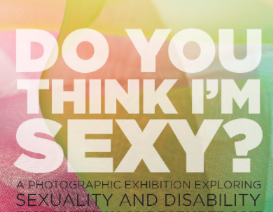There is a photography exhibition going on at the moment at CCS Disability Action called ‘Do you think I’m Sexy?’ The topic is female sexuality and disability and the aim of it is to spark discussion about that very issue.
Female sexuality in general is a topic that is misrepresented and objectified a lot of the time due to the damaging portrayal of women in the media. We often don’t speak, have no opinion and the female body is primarily just a body that is there for the male gaze.
Therefore, you can imagine how the female body that has a disability is underrepresented than the able-bodied one in the media, which inevitably leads to misrepresentation and misconceptions in the real world.
The perceptions of both men and women with disabilities is typically that of a placid person who simply cruises through life and isn’t particularly self-aware. The reality is that the opposite is true. For women with physical disabilities in particular, becoming comfortable with a body that is massively different to the majority of people is crucial, especially with the prevalence of a particular standard of beauty, but can also be a painful and emotional journey.
With the widespread perception of women with disabilities being what it is, it makes this process somewhat more difficult. It’s quite hard to become comfortable in the skin that you’re in when the very topic of the disabled body is taboo, not to mention barely seen in the media. What it leads to is having to keep quiet for the sake of avoiding an uncomfortable and awkward conversation, therefore turning the whole situation into a non-issue.
Essentially it’s a form of objectification. Yes, it’s a different type, but its objectification nonetheless in the sense that we’re often looked at in a one-dimensional way.






I believe it all ties in; whether a body has a physical disability or is one that doesn’t quite meet the Physical Ideal, as defined by (predominently) American cultural imperialism.
When you have female models younger, thinner, and more child-like looking, the whole body image thing becomes a gross distortion.
One way to counter this is in our High Schools, with education.
Educate young people about the “beauty myth” and suddenly their consciousness is raised by a factor of hundreds. Advertising no longer quite has the same power to focus minds on distorted values and present them as the “norm”.
Instead, minds can be trained to identify and reject such such objectification and exploitation.
It’ll be a long, hard process, but I believe education and consciousness-raising is the key.
Comments are closed.